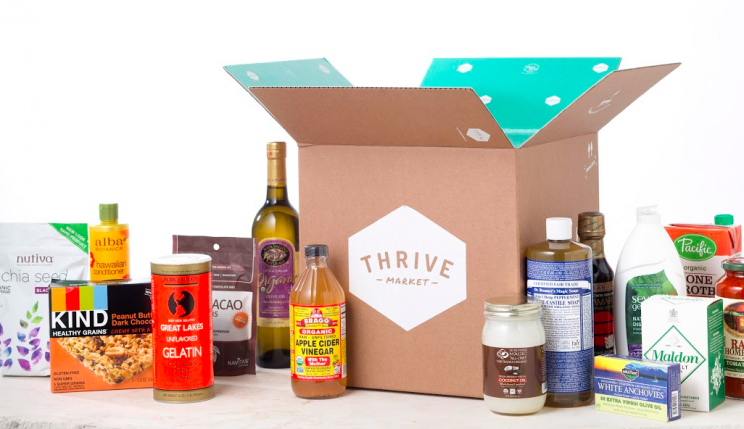A bunch of celebrities are backing an organic grocery service for middle class moms
Just two years ago, Gunnar Lovelace was running his organic grocery startup out of a church and letting an employee crash at his place. Now, his company, Thrive Market, has 600 employees.
Thrive has raised a total of $141 million from Greycroft Partners, E-Ventures and celebrities like John Legend, Will Smith and Demi Moore. Its first investors, however, included self-help writer Tony Robbins, fitness celebrity Jillian Michaels, and New Age health guru Deepak Chopra.
Lovelace said he reached out to three of the country’s biggest influencers out of necessity.
Before launching the company, he and co-CEO Nick Green went on a road show between Los Angeles, San Francisco and New York City, and were rejected by over 50 VC firms. He said these failures actually gave him a renewed perseverance and forced him to look at alternative ways to raise money.
“It forced us to get really good at influencer coalition building,” he told Yahoo Finance.
Thrive targets middle-class Americans who live in places without a Whole Foods around the corner. Thrive’s primary differentiator is that it is a highly curated organic, non-GMO product mix (including its own private label) at an affordable price point. Membership costs $59.95 per year to access the site, but the company guarantees its products cost 25%-50% less than what you would see at a normal health foods store. Think of it as the membership model of a Costco (COST) that allows you to buy the items you see on the shelves of Whole Foods (WFM) with the added convenience of Amazon (AMZN) delivery.

“Thrive buys directly from the brands, which allows the company to operate without middlemen taking a piece of the profit. We cut out the brokers, distributors, and all the retail markups and pass those savings along to our members,” he said.
Thrive’s core mission is to provide healthy, affordable choices to middle-class Americans outside of wealthy cities and neighboring suburbs.
In fact, the company’s first $10 million in capital came from a broad coalition of influencers that not only included household names in the health and wellness space — but ordinary parents as well. The middle-class mother is Thrive’s target consumer: someone who wants to raise a healthy family but may also be constrained by a budget.
Take, for instance, Katie Wells, the founder of “Wellness Mama,” a blog that offers practical tips, recipes and natural remedies for fellow parents. She was one of Thrive’s first investors.
“Katie has 6 million unique visitors per month. She’s a mom of six in Kentucky. These are the types of folks that ended up investing and being a part of our community,” Lovelace said.
Eighty-five percent of Thrive’s customers are female and the average household income is less than $100,000, according to a Vator News interview with Green.
Fifty percent of the company’s membership base is in the Midwest and Southeast. And its two fulfillment centers are located in Nevada and Indiana, so they can easily cater to the bulk of their customers.
“We’re not going after the lifelong Whole Foods shopper who lives in New York or LA or San Francisco, is relatively price-insensitive, and has a Whole Foods within driving distance if not walking distance,” Green told Vator. “We’re really focused on the middle class, largely moms, who are becoming increasingly aware of the effects of eating high sugar, heavily processed diets that have become so widespread.”

Their vision to provide healthy options for average Americans extends beyond its product mix. For every paid membership, the company gives a membership away to a low-income family. Even after the first year, these families don’t have to pay for membership renewal.
The company now has over 350,000 members and has provided free memberships to over 375,000 families. This June, Lovelace even spearheaded a campaign to let people use food stamps online.
After gathering over 300,000 signatures, the United States Department of Agriculture (USDA) committed to a timeline to bring food stamps online by the first half of 2017. The movement gained so much traction that the Republican chairman of the House Agricultural Committee invited Lovelace to testify before Congress on Wednesday.
“The great thing about making healthy living affordable to everybody is that it transcends ideology,” Lovelace said. “It doesn’t matter who you are, where you live, what you believe or what the color of your skin is, everybody wants to feel good in their bodies, everybody wants the same thing for their children.”
Melody Hahm is a writer at Yahoo Finance, covering entrepreneurship, technology and real estate. Follow her on Twitter @melodyhahm.
Read more:
How the gig economy will fare under President Trump
Pixar’s first finance chief on why he decided to work for Steve Jobs
Silicon Valley giant Max Levchin shares his hopes for a Trump presidency

 Yahoo Finance
Yahoo Finance 